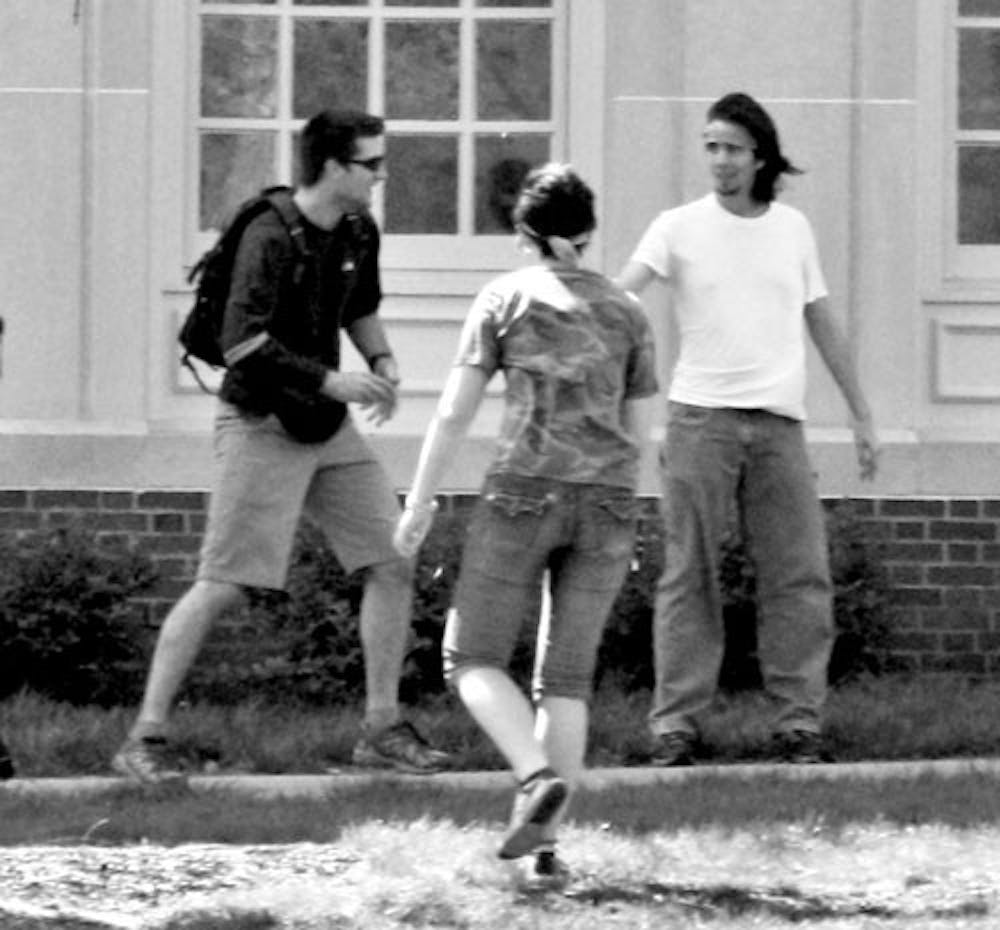
A zombie looks to infect two innocent humans. (CHELSEA FOUGHT | The Miami Student)
Over the weekend, Miami University was the site of a spreading infection that turned humans into the living dead. At least, this was the premise of Humans vs. Zombies (HvZ); a game played by Miami students from Thursday to Sunday.
The moderating team for the game met Sunday evening to discuss the concluded event and the future of the game on campus. Scott Spalding, a graduate student, was one of the key moderators in establishing the game on campus. According to Spalding, HvZ is a nationally organized game played at over 650 colleges.
"I first heard about it probably about a year ago from some friends who had friends that played it at Purdue (University)," Spalding said. "The event has become extremely popular at Purdue: there is a massive game of over 1,000 players every semester."
Spalding and other moderators registered the event officially at the HvZ website. Registration is free of charge and the Miami moderators also chose to make the game free for players. According to Spalding, the game is essentially a modified version of tag.
"All the human players have to wear bandanas around their arm and if they get tagged by a zombie player they switch their bandana to their head to mark them as a zombie," Spalding said. "How the humans stave off the zombies is they just throw marshmallows at them. If a zombie is hit by a marshmallow, they are stunned, take off their bandana and can't tag anyone for 15 minutes."
Spalding said the game does have various additional complexities in the form of "missions" ranging from escorting a player pretending to be injured to finding an item at point A and using it at point B. All missions are based on popular zombie genre stereotypes, Spalding explained.
However, while zombie infections are typically fictionalized as spreading like wild-fire, the road to allowing zombies to invade Miami was not an easy one. According to Spalding, last year a group of unprepared students tried to bring the game to campus but were denied by the university.
"They had a bunch of concerns about the safety and organization of the event," Spalding said. "So, in preparation for this year's game, we looked at other schools that put the game on, what their safety rules were and came up with some new ideas for safety and we came to the administration with those ideas already prepared and started off on a much better foot."
Spalding said players were required to sign a safety waiver, attend one of three safety meetings and follow all of the rules, including: no playing by doors, no playing inside and no crossing over major roads. He also explained the game normally employs the use of NERF blasters, but the university was apprehensive about these for safety reasons. Therefore, the group elected to use marshmallows. According to Spalding, these proved to be beneficial for an additional reason.
"We tried our best to pick up all of the marshmallows but part of the reason why we chose marshmallows and why the university didn't have a problem with us throwing those around, is that they get picked up by squirrels and other animals and are degradable," Spalding said.
Enjoy what you're reading?
Signup for our newsletter
According to the moderators, there was not a single argument during the game and the group also did not run into any sort of alcohol related trouble or other issues that on campus events frequently encounter. They believe that the success of the event will cause the administration to give future HvZ games more flexibility, including, potentially, the use of NERF blasters.
Third year Chelsey Fought, who was one of the students that helped moderate the event, was happy with the turn out for the game.
"Attendance was shockingly great. Thursday night, when we were starting the game, we had about 40 students," Fought said. "As the game got rolling, we ended up having 71 student players."
Junior Brian Vazquez, another moderator, felt the student body as a whole seemed pretty interested in the game.
"As we were playing, people would open their windows all the time and shout ‘are you a human or a zombie?'," Vazquez said. "People seemed really interested."
The group is confident the university will allow another game to be played in the fall and they hope for an even greater turnout. In the meantime, the student body should be happy to hear that the zombies have been staved off: for now.
"Eight human players out of 71 ‘survived'," Spalding said. "Which means the zombies did not win. But we're going to hopefully have another game next semester and anything can happen."




